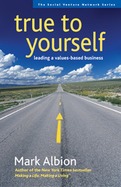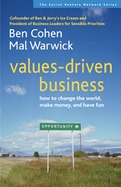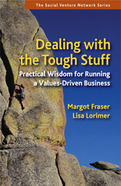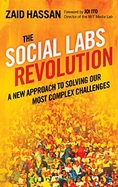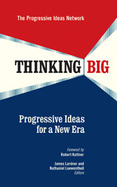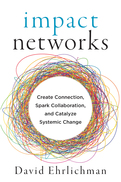2006
Drawing on insightful interviews with seventy-five forward-thinking leaders and his own extensive experiences as an entrepreneurial leader, Mark Albion details five critical leadership practices:
Turn your values into value
Walk toward the talk
Communicate with care
Facilitate personal growth
Collaborate for greater impact
True to Yourself shows how successful businesspeople have put these practices into action, and it provides hands-on exercises to help you integrate them into your own business. This trusted guide will help you avoid mistakes while making your job easier, your company more successful, and your life more fulfilling.
• By the author of the New York Times bestseller Making a Life, Making a Living
• The second volume in the Social Venture Network Series for small businesses
• Draws on the author's experience and interviews with 75 innovative small business leaders to offer a practical guide to leadership practices needed to build a business that reflects your values
• Find out more
• The premier title in the Social Venture Network (SVN) Series--SVN is a nonprofit network of the most prominent socially conscious business leaders in North America, representing Ben & Jerry's, Working Assets, Tom's of Maine, Eileen Fisher, Clif Bar, and many others. Find out more about the series
• Combines the tried-and-tested wisdom of the co-founder of Ben & Jerry's and the chair of the Social Venture Network Advisory Board
• Concise and practical format includes a self-assessment tool, checklists, and other user-friendly features
• Listen to podcasts of Mal Warwick talking about Values-Driven Business on the Good Life radio show
• Offers personal insights and advice from of some of the most successful socially conscious entrepreneurs in the country
• Features dozens of true stories revealing what it’s really like to run a values-driven business—the good, the bad and the ugly
• Includes tested tools, techniques and coping strategies for overcoming common and not-so-common challenges
Your business plan is only going to get you so far. When you’re actually running a values-driven business problems come up that you never could have anticipated. And as a mission-driven organization you face issues your more conventional colleagues never have to grapple with. The whole experience can be incredibly isolating and draining.
Margot Fraser and Lisa Lorimer have been there, and they’re here to help. Together with five of their colleagues—including Stonyfield Yogurt founder Gary Hirshberg and former Ms. Foundation president Marie C. Wilson—they offer the kinds of personal insights and seasoned advice you just can’t get in business school. It’s like having a coaching session with some of the nation’s top socially conscious entrepreneurs.
Each chapter of Dealing with the Tough Stuff tackles a particular challenge. How open and honest can you really be with your employees and still run an efficient business? At what point do you seek outside expertise? What do you do when things go terribly wrong? When is it time to leave? The authors and the members of their “advisory board” share their experiences—not just what worked, but sometimes what spectacularly didn’t. Some of these stories are harrowing: a worker getting killed by factory equipment, a supplier embezzling funds, a false accusation of intellectual property theft. Others are simply day-to-day conundrums: meeting payroll when you’re always in debt, deciding when and how to expand in a responsible way, balancing business needs with your commitment to the triple bottom line. At the end of each chapter, Lorimer and Frasier draw on the stories to offer practical "survival suggestions" that can guide readers through similar situations.
This is a book that readers can look to for affirmation, hope and tools. Others have been through what you’re going through, if not worse. They made it and so can you—because they’re going to show you how they did it. No book can cover every challenge that might arise, but if you learn from the attitudes, techniques and coping mechanisms these seasoned leaders offer, you’ll get through the tough stuff with your sanity and your business intact.
People often ask, "If we can put a man on the moon, why can't we solve global hunger?"
Current responses to our most pressing societal challenges—from poverty to ethnic conflict to climate change—are not working. These problems are incredibly dynamic and complex, involving an ever-shifting array of factors, actors, and circumstances. They demand a highly fluid and adaptive approach, yet we address them by devising fixed, long-term plans. Social labs, says Zaid Hassan, are a dramatically more effective response.Social labs bring together a diverse a group of stakeholders—not to create yet another five-year plan but to develop a portfolio of prototype solutions, test those solutions in the real world, use the data to further refine them, and test them again. Hassan builds on a decade of experience—as well as drawing from cutting-edge research in complexity science, networking theory, and sociology—to explain the core principles and daily functioning of social labs, using examples of pioneering labs from around the world. He offers a new generation of problem solvers an effective, practical, and exciting new vision and guide.
2009
2021
The social and environmental challenges we face today are not only complex, they are also systemic and structural and have no obvious solutions. They require diverse combinations of people, organizations, and sectors to coordinate actions and work together even when the way forward is unclear. Even so, collaborative efforts often fail because they attempt to navigate complexity with traditional strategic plans, created by hierarchies that ignore the way people naturally connect.
By embracing a living-systems approach to organizing, impact networks bring people together to build relationships across boundaries; leverage the existing work, skills, and motivations of the group; and make progress amid unpredictable and ever-changing conditions. As a powerful and flexible organizing system that can span regions, organizations, and silos of all kinds, impact networks underlie some of the most impressive and large-scale efforts to create change across the globe.
David Ehrlichman draws on his experience as a network builder; interviews with dozens of network leaders; and insights from the fields of network science, community building, and systems thinking to provide a clear process for creating and developing impact networks. Given the increasing complexity of our society and the issues we face, our ability to form, grow, and work through networks has never been more essential.


